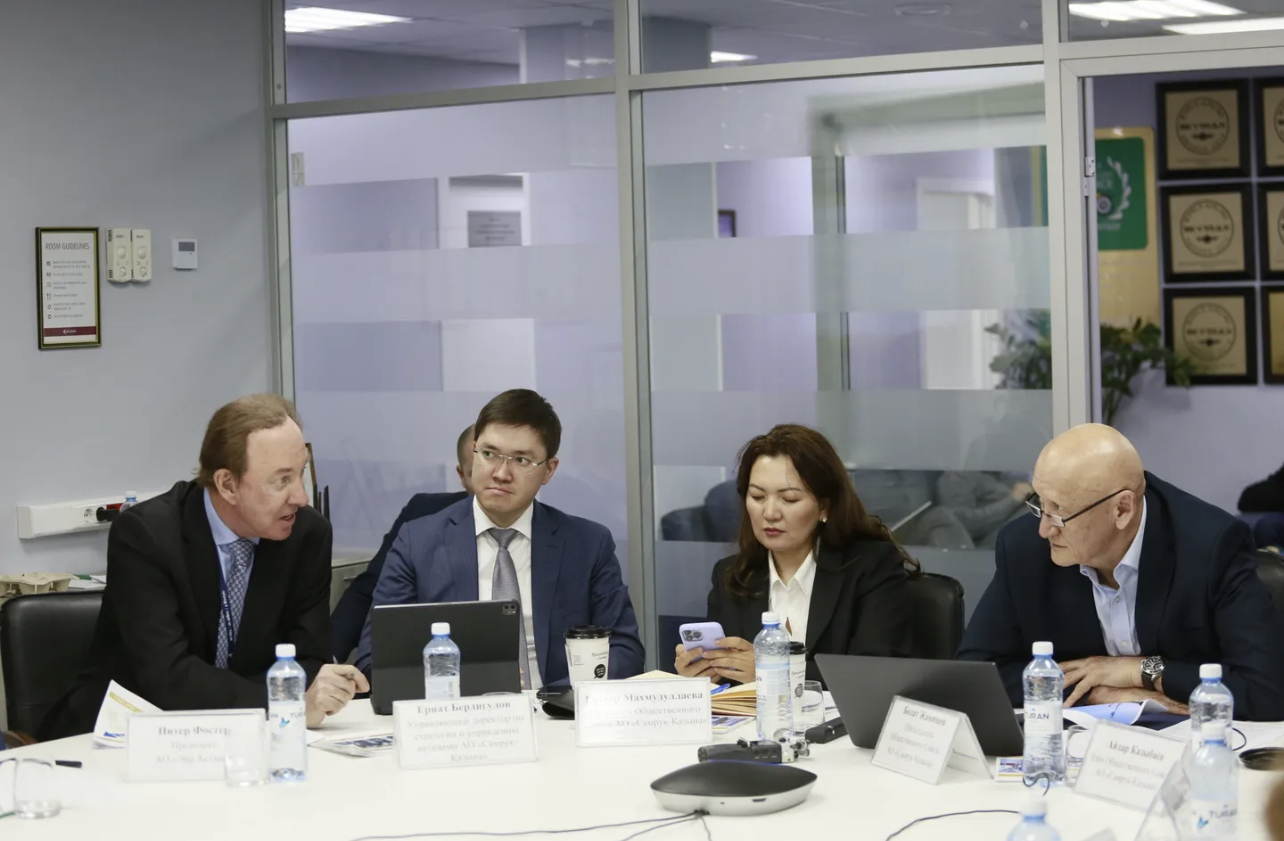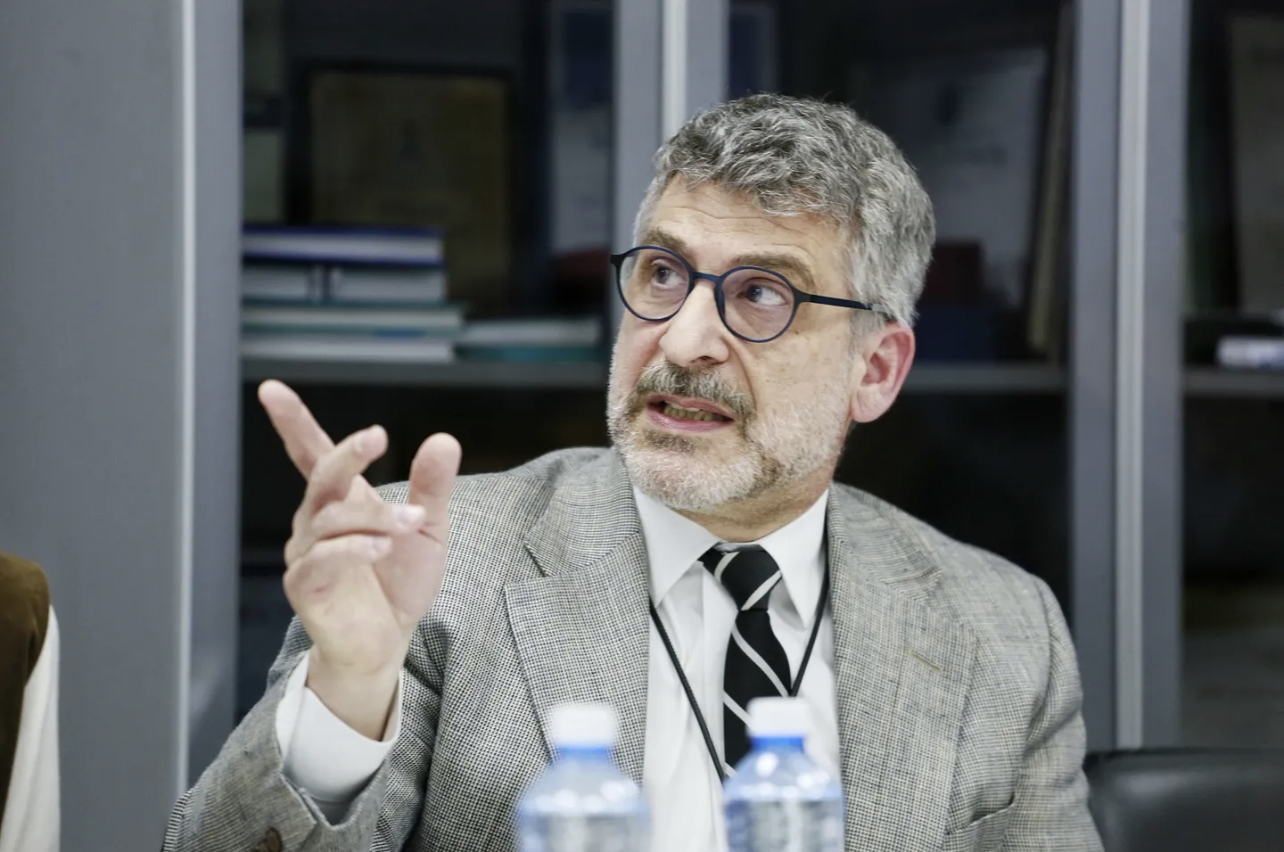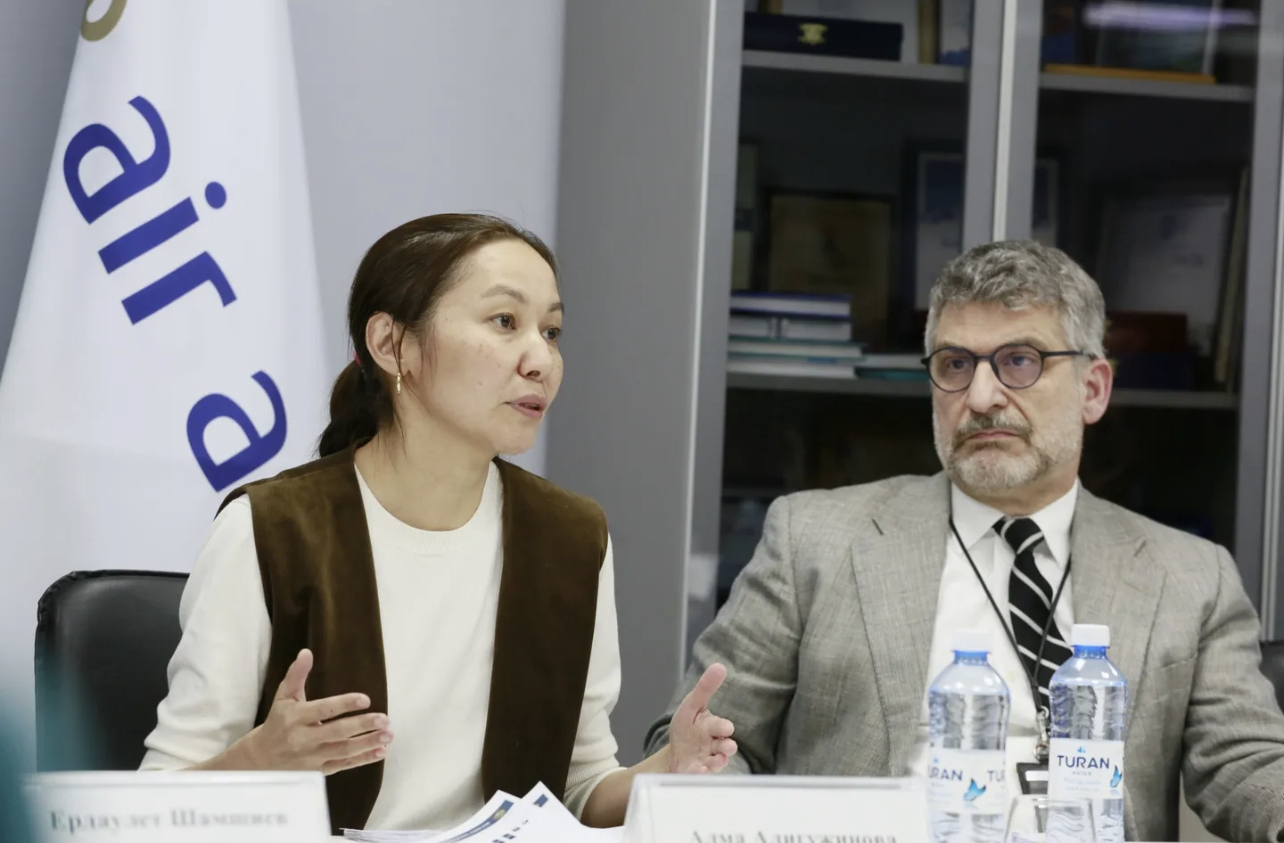ASTANA — Air Astana’s management addressed concerns about domestic flight prices and flight delays, which have become more frequent in the past few years, at the Public Council meeting of Samruk Kazyna Sovereign Wealth Fund on the airline’s activities on April 21. The meeting was chaired by the Head of the Samruk Kazyna Public Council Bolat Zhamishev.

Head of the Samruk Kazyna Public Council Zhamishev proposed capping the price of Air Astana tickets and advised the company to explain how its fare is structured on April 21. Photo credit: Kapital.kz/ Ruslan Pryanikov.
Concerns about air ticket costs are being addressed in a timely manner, according to Air Astana President and CEO Peter Foster. He noted that the difference between the average fare of Fly Arystan [a low-cost airline in the Air Astana group of companies] and Air Astana on domestic routes is nearly 40 percent, demonstrating that Fly Arystan’s fares are competitive when compared to any carrier in the world.
“They are among the lowest. The results speak for themselves. Kazakhstan’s domestic air transportation market is now the world’s fastest-growing. The reason for this can only be that the tariffs are affordable and among the lowest in the world,” Foster explained.
He underlined that the airline is doing everything possible to keep fares affordable for customers, although countries worldwide are experiencing high inflation. According to Foster, this is critical given Kazakhstan’s geography and the remoteness of the regions. In this case, flight travel is the most convenient option. According to the Air Astana CEO, several factors affect the cost of air travel, including jet fuel, the cost of the aircraft, the cost of engineering and technical support, fees for employees, as well as airport services and navigation support.

Air Astana Director of Operational Training Siakkas said the flight punctuality indicator increased to 88 percent in March. Photo credit: Kapital.kz/ Ruslan Pryanikov.
Concerning jet fuel, Foster said that Kazakhstan’s domestic market does not cover the total need for aviation fuel for all carriers. The company gets almost two-thirds of the required volume in Kazakhstan, while the other one-third is purchased from abroad.
“Traditionally, Russia imports one-third of all jet fuel. Around 80 percent of the volume is purchased directly from the refinery. Like other airlines, we buy through intermediaries for around 20 percent of our purchases. Of course, we do not like this. We believe there is no reason for these intermediaries to exist,” Foster stated.
Managing Director for Strategy and Management at Samruk-Kazyna Yernat Berdigulov confirmed that one-third of jet fuel is imported, given that the consumption volume is 900,000 tons annually. In comparison, three refineries in Kazakhstan produce nearly 600,000 tons of jet fuel.
“There are plans to double the refinery’s capacity, from 6 billion to 12 billion tons. The country’s jet fuel production should increase to around 1 million tons just as we satisfy the domestic demand,” Berdigulov added.
The meeting also highlighted that the airline’s airfare varies significantly depending on the date of purchase and how close the flight date is. According to Air Astana, the cost of a ticket increases based on the aircraft’s capacity and the time before departure – ticket prices increase closer to departure.
Public Council members argued however that this strategy would result in the airline losing money and compromising its reputation. Bolat Zhamishev proposed capping the price of Air Astana tickets.
He stressed the need to provide transparent information in any industry and advised Air Astana to explain how its fare is structured.
“I hope you will make your tariff policy public. Maybe you can establish limits. Because even if you sell the last ticket for 200,000 tenge, you will not make much money, but you will risk your reputation among millions. Most passengers fly for 15,000-16,000 tenge, while others fly for 70,000 tenge. The market is the market, but for a company with government capital, a reputational risk of this sort is worth considering,” Zhamishev said.
According to Peter Foster, engineering and technical support in the aviation industry make up a considerable percentage of the cost, given that all spare components must be certified and each has its own limited life.
“This is constantly regulated. Therefore the fees are costly. Apart from the spare parts, the largest component of these costs is the major forms of maintenance that aircraft must undergo regularly. We opened our repair center in Astana about four years ago, and today we can perform most of the necessary tests at home,” Foster said.
Air Astana Chief Planning Officer Alma Aliguzhinova informed that Air Astana and Fly Arystan currently operate 43 aircraft, 11 of which have been added in the last five years. She mentioned that the average age of an aircraft is five years.

Air Astana Chief Planning Officer Aliguzhinova said the airline will purchase a Boeing 787 Dreamliner by 2025, making it the largest long-haul aircraft in its fleet. Photo credit: Kapital.kz/ Ruslan Pryanikov.
“They were all purchased entirely at the expense of the airline’s own and borrowed finances, with no guarantees from the government or the state budget, and at the expense of the airline’s development,” Aliguzhinova said.
According to the company’s development strategy, the fleet will be expanded to 64 aircraft by 2027. Aliguzhinova stated the airline will purchase a Boeing 787 Dreamliner by 2025, making it the largest long-haul aircraft in its fleet.
Despite the fact that Air Astana halted flights to Russia and Ukraine, the airline replaced them with other flights, including new destinations such as Phuket and the Maldives.
“We are currently putting more focus on direct passenger traffic. This is a global trend, and the Fly Arystan route network is expanding both in Kazakhstan and on the next medium-haul flights,” Aliguzhinova said.
The meeting participants also addressed the issue of Air Astana flight delays. In 2022, this metric deteriorated significantly, attracting the attention of both government agencies and the public at large.
According to Air Astana Director of Operational Training Philippos Siakkas, this indicator for the airline was at 74.14 percent last year, a decrease from historical data that were previously at the same level and considered good. He argued that this figure is acceptable compared to airline companies in the European Union.
The punctuality of the flights increased to 88 percent in March, according to Siakkas. However, it remains low at European airports. He said that to avoid problems with flight delays, the airline implemented the use of reserve aircraft, extending it to two units this year.

